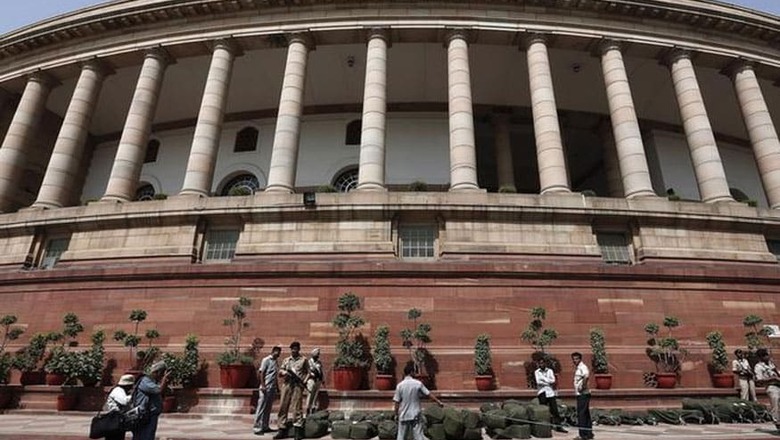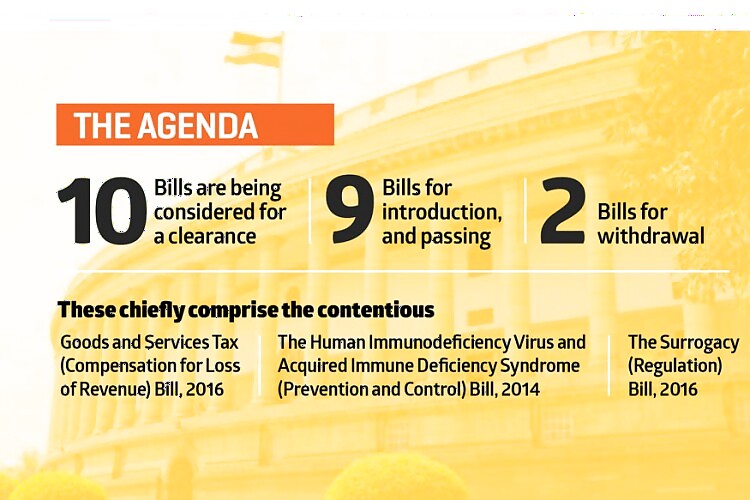
views
With the Winter session starting from tomorrow, the fireworks are expected in the Parliament as the Opposition will attempt to corner the NDA government over many issues, chief among them being demonetisation.
-The Lok Sabha and Rajya Sabha will meet for the winter session between November 16 and December 16, 2016. There will be a total of 22 sessions.
- Some of the important bills listed for consideration and passing include the consumer protection bill, 2015; HIV Aids (prevention and control) bill, 2014; maternity benefits (bill), 2016 that increased the maternity leave to 26 weeks and even grants leaves to adopting and commissioning mothers; citizenship (amendment) bill, 2016 that proposes illegal migrants from afghanistan, bangladesh and pakistan from specified religious groups
- Other important bills also include the contentious Whistle Blowers Protection (Amendment) bill, 2015; prevention of corruption bill, 2013; and enemy property (amendment and validation) bill, 2016.
- Three legislative pieces of the primary GST act that was passed in the last monsoon session will be introduced by the government for passage

Here’s a list of the most anticipated action expected inside the holy grail of Indian democracy:
1. Demonetisation: The issue that is staring the Parliament in the face: this is, of course, the first and major bombshell that is going to launch itself on the winter session. Ever since Prime Minister Modi, in an address to the nation on November 8, announced that the Rs 500 and Rs 1000 notes would no longer be valid, opposition parties across the country have gone berserk. Though some are genuinely concerned about the hardships that citizens face, most, it seems are worried about the large amounts of unaccounted money that fund Indian politics. It is for this reason that parties of all ideologies are expected to crush the government for demonetisation.
Oposition parties, that will come with all guns blazing on demonetisation include, the Congress, Bahujan Samaj Party, Trinamool Congress, Aam Aadmi Party and Samajwadi Party. In fact, the Congress is attending the session with a single-minded focus towards two issues, demonetisation and repeated ceasefire violations from Pakistan. Congress spokesperson Ajoy Kumar made this clear by saying, “We will raise government’s failures on all fronts, including black money and issues concerning farmers. There have been about 300 ceasefire violations in Jammu and Kashmir in the last one-and-a-half months which has resulted in soldiers being martyred and civilian deaths.”
2. Government’s push on GST: While the Opposition is bothered about demonetisation, the government’s key interest lies elsewhere. The government is hoping with a desperate passion that three GST legislations get passed during the winter session. The aim seems to be, to enable the April 2017 implementation of the GST across the country. As a result, the central goods and services tax bill, integrated goods and services tax bill and goods and services tax (compensation for loss of revenue) bill have been categorised “high priority” in the legislative business agenda. According to reports, Parliamentary affairs ministry sources have said that the three legislations would be introduced in a phased manner during the winter session of the Parliament.
3. The Congress’ disapproval of the government’s GST plans: The congress it seems is entering the GST battlefield with a large neon sign declaring, “We will oppose you!”. This Monday, the Congress made this plan very clear by stating that it will oppose goods and services tax in the upcoming winter session of parliament if four slabs of taxation up to 28 per cent are introduced.
Further, Congress spokesperson Randeep Singh Surjewala said, “For the country’s development, we are in favour of GST. But the doubt Congress vice-president Rahul Gandhi and other Congress leaders had, is now proving to be true.” He then added, “Congress had always maintained that the 18 per cent cap on GST should not be increased as it will lead to further inflation and people will suffer. It has come to light that Modiji and Jaitleyji are now talking about fixing the tax up to 27 percent in four slabs. If they do it, then we’ll oppose it.”
4. A push for mental health: Another key plan of the government, this session, is to push for better mental health and the rights that come along with it. However, this seems to be one of the easier challenges for the government as the mental health care bill, 2013, which replaces the mental health act of 1987 has already been passed by the Rajya Sabha on Aug 8, 2016. It is only in the Lok Sabha, where the government has a majority, that the bill awaits passage. The mental health care bill aims to protect the rights of persons with mental illness and promote their access to mental health care.
5. Giving mothers their right: The government aims to set a centuries-old wrong right by ensuring that mothers finally get their due. The opposition is expected to co-operate in ensuring the passage of the maternity benefits (amendment) bill, 2016 which has already been passed by the Rajya Sabha on August 11, 2016. Though this could largely be because no political party would want to face the wrath of an angry mother, the move will be hugely beneficial for the nation. The bill aims to increase the maternity leave to 26 weeks and it grants leave to adopting and commissioning mothers. Further, the bill if passed would require establishments with 50 employees or more to provide crèche facilities.
6. Protests galore: According to reports, the Delhi Police has already sent both the Lok Sabha and the Rajya Sabha secretariats a list of 30 planned protests that the are set to take place outside the Parliament building so as to draw the attention of lawmakers. The government’s stand on triple talaq, missing JNU student’s case, pending dues for sugarcane farmers, reservation in private sector, among others are the issues that the protestors will be targeting this winter. Reports also state that an organisation of Muslim ulemas, the All India Tanzeem Ulema-e-Islam, plans to organise a protest march on the issue of Triple Talaq on November 18.
7. The Indian Citizenship: This has long been a part of the contentious issues that subsequent governments have tried to find a solution to but since different parties have differing opinions on it, legislation has been repeatedly stalled. However, the government aims to finally push the citizenship (amendment) bill, 2016 that proposes that illegal migrants from Afghanistan, Bangladesh and Pakistan from specified religious groups that are prosecuted in those countries such as, Hindus, Sikhs, Buddhists, Jains, Parsis and Christians will be eligible to apply for Indian citizenship. This was one the key issues that BJP’s election manifesto presented for the 2014 elections and it seems that the government is intent on keeping up its promise.
8. United we stand: It seems the government and its allies have just two words to confront the thunderstorm of opposition coming their way and they are “stand united!”. Discussing this strategy, leaders of the ruling national democratic alliance (NDA) on Monday met in New Delhi and passed a resolution expressing full confidence in the decision on demonetisation taken by Prime Minister Narendra Modi. According to information and broadcasting minister M. Venkaiah Naidu, Prime Minister Modi assured the NDA leaders that “credit for the decision would not go to him personally but all parties standing firm with him.” Reports also state that the union parliamentary affairs minister Ananth Kumar said, “All NDA allies expressed support to Prime Minister Narendra Modi’s decision on demonetisation, and parties said they were behind him on this issue.”




















Comments
0 comment